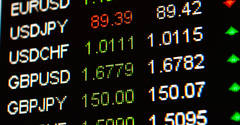
On the first of November, shortly after the Royal Bank of Scotland had suspended two traders in connection with the Financial Conduct Authority’s investigation into the manipulation of foreign exchange rates, Barclays suspended six of its own traders. The probe into these allegations intends to clarify whether traders colluded to artificially influence crucial benchmarks in their favour when trading currencies during short windows of 60 seconds. Six of the leading banks in the foreign exchange market have confirmed they have received requests from regulators to contribute to the investigation.
With $5 trillion worth of trading every day, the currency market is by far the largest financial market, dwarfing all other markets in comparison. Yet to this day, the largest financial market of all remains the least taxed, utterly opaque, completely deregulated and prohibitively expensive for end-users. It is nearly impossible to get information on the actual currency price of the most recent trades and the fees or commissions charged by intermediaries for trading currencies are hardly ever disclosed to the individual clients - be it upfront or ex post. EuroFinUse believes this is an alarming situation that needs to be addressed post haste and is miffed by the fact that the European Union institutions missed the opportunity to submit these markets to regulation.
The gigantic trade volume generated by currency markets bears no relation whatsoever to the real economy. In reality the vast majority of the foreign exchange transactions are executed by and for financial institutions. In light of the EU’s stated intentions to have the financial sector contribute more fairly to the costs of dealing with the crisis - given their part of the responsibility vis-à-vis the crisis as well as the current under-taxation of the sector – it is the more shocking that these transactions have not been mentioned either by the EU or by national governments with respect to, for instance, the Financial Transactions Tax.
As clearly illustrated by a series of so-called Libor scandals, currency markets operate in ‘no man’s land’ when it comes to supervision and are left unchecked by regulators. There is no good reason for this. If anything, there are plenty of reasons to enforce the same transparency rules for currency markets as for equities and submit these markets to more supervision and more competition. Individual investors and consumers would then benefit from a transparent and competitive market with reasonable prices for currencies.
Please read EuroFinUse Blog's post The Currency Market: another scandal yet to happen? and the Financial Times article here.
